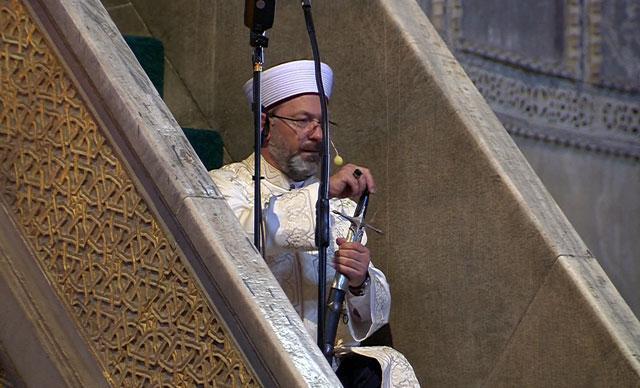
The khutbah (sermon) Ali Erbaş, the head of Turkey’s Presidency of Religious Affairs (Diyanet), delivered at the first Friday prayers performed at Hagia Sophia on July 24 after the historical structure was turned into a mosque from a museum has stirred a fierce debate as critics claimed that the country’s top imam targeted Mustafa Kemal Atatürk, the founder of the republic.
“Any property that is endowed is inviolable in our belief and burns whoever touches it; the charter of the endower is indispensable and whoever infringes upon it is cursed,” Erbaş said in the sermon.
Politicians from the main opposition Republican People’s Party (CHP) and İYİ (Good) Party claimed that Erbaş’s remarks were targeting Atatürk, some calling on him to resign.
A cabinet decree back in 1934, when Atatürk was still alive, had turned Hagia Sophia into a museum. On July 10, a Turkish court annulled this decree, paving the way for its use again as a mosque after an 86-year hiatus.
Erbaş dismissed claims that he cursed Atatürk in the sermon.
“All deeds of trusts for foundations conclude with such a curse. And in my sermon, I referred to this and I referred not only to Hagia Sophia but all foundations. I also did not refer to the past but the future,” Erbaş told daily Hürriyet.
He also pointed out that it is a controversial issue among historians if Atatürk played a role in turning Hagia Sophia into a museum.
“Atatürk passed away 82 years ago. Prayers are said for those who passed away, not curses,” Erbaş said.
As the head of Diyanet he said it is his duty to remind the public of protecting foundations’ properties. “I am fulfilling this duty.”
However, politicians from the CHP and İYİ Party lashed out at Erbaş for his remarks.
“You will pay the price for bedamning Atatürk,” said Özgür Özel, the deputy group head of the CHP.
Gürsel Tekin, a lawmaker from the CHP, said no public servant can insult Atatürk, while another CHP lawmaker, Mehmet Ali Çelebi, said cursing at Atatürk is tantamount to treason.
“One day there may be political and judicial consequences for Erbaş,” said Lütfü Türkkan, the deputy group chair of the İYİ Party.
Aytun Çıray, a lawmaker from the İYİ Party, called on Erbaş to step down, saying that the head of the Diyanet in fact did not even know what was written in Sultan Mehmed the Conqueror’s foundation charter he referred to.